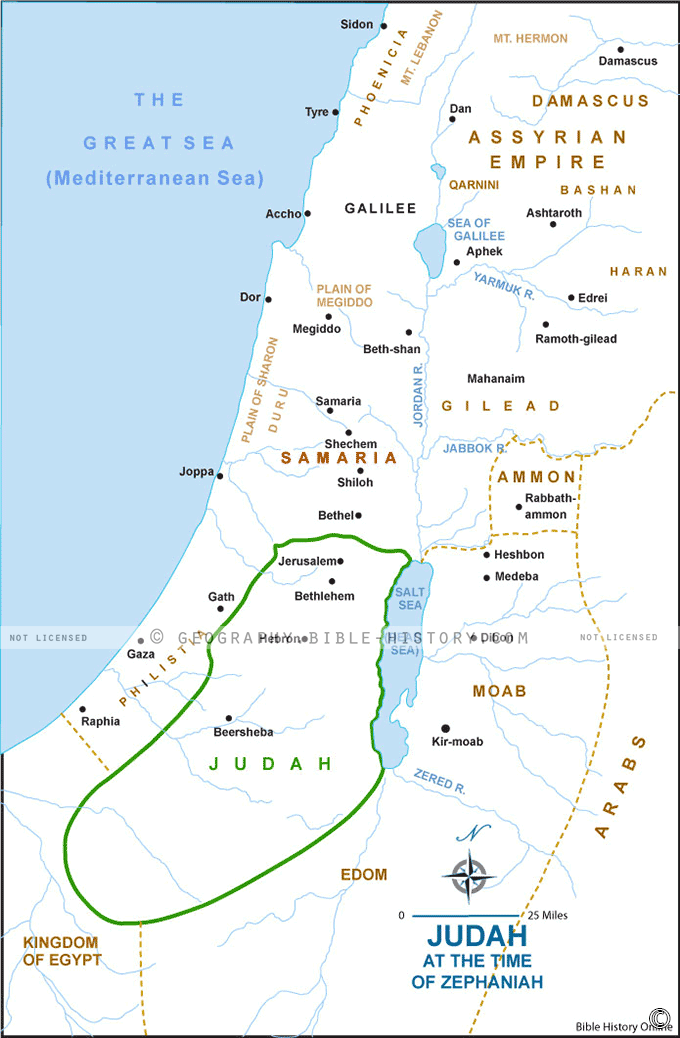
Judah during the time of the prophet Zephaniah was a kingdom grappling with both political instability and moral decay. Zephaniah, one of the minor prophets of the Old Testament, delivered messages of warning and hope during a critical period in Judah's history.
Historical Context
Zephaniah's prophecies were primarily delivered during the reign of King Josiah, who ruled Judah from around 640 to 609 BCE. This era was marked by a complex web of political alliances and conflicts, with Judah situated between the powerful empires of Egypt and Babylon.
Moral and Religious Challenges
One of the central themes of Zephaniah's prophecies was the moral and religious corruption that had taken hold in Judah. The people had turned to idolatry and worshiped foreign gods, leading to a spiritual decline. Zephaniah's messages called for repentance and a return to the worship of Yahweh, the God of Israel.
Judgment and Restoration
Zephaniah's prophecies alternated between messages of judgment and messages of hope. He warned of impending divine judgment on Judah for its sins but also held out the promise of restoration for those who repented. His words emphasized the universal scope of God's sovereignty and the importance of humility and righteousness.
The Day of the Lord
Zephaniah introduced the concept of "the Day of the Lord," a theme that would later appear in other prophetic writings. This day was seen as a time of reckoning when God would judge the nations and purify the faithful. It carried both a message of dread and an invitation to seek God's refuge.
Legacy and Relevance
The messages of Zephaniah continue to resonate in religious and moral discourse. They remind us of the enduring struggle between faith and worldly distractions and the call to return to a righteous path. Zephaniah's prophecies also provide historical insights into the challenges faced by Judah during a critical juncture in its history.
Judah at the time of Zephaniah serves as a compelling backdrop to the prophetic messages delivered during this era. It was a time of moral crisis and political tension, and Zephaniah's words continue to be a source of reflection and inspiration, emphasizing the timeless importance of faith, repentance, and righteousness.
Blank Topo Map of The World
Abraham’s Journey
The Captivity of Judah (586-516 B.C.)
The Fall of Judah 586 B.C.
The Northern Kingdom of Israel
The Southern Kingdom of Judah
The Divided Kingdom
The Fertile Crescent
Ur of the Chaldees
Shechem in Old Testament Times
Prophets, Kings, and Nations
Jesus Last Passover
New Testament Israel
New Testament Places
Old Testament Israel
Provinces of the Roman Empire
Israel during David’s Kingdom
David’s Kingdom
Cities of the New Testament 4
Cities of the New Testament 3
Cities of the New Testament 2
Mediterranean Sea
Cities of the New Testament
First Century Jerusalem
Empire of David and Solomon
David’s Kingdom
Israel Under Rehoboam
Ophir and Tarshish
The Period of the Kings
Ramoth Gilead
Samaria
Solomon’s Temple
Zarephath and MT Carmel
Jabesh Gilead and Tribes
Judah in the Time of David
Kingdom of Saul
Kirjath Jearim
Michmash
Mount Gilboa in the Time of David
Nob Davids Flight
Shiloh
Israel and Judah
Assyrian Empire Under Esarhaddon
Assyrian Empire Under Sennacherib
Captivity of 10 Tribes
Events in 2 Kings
The Khabur River
Israel and Syria
Captives From Judah
Kingdom of Jeroboam
Mesha’s Kingdom
Pharaoh Necho Battles King Josiah at Megiddo
Babylonian, Mede and Persian Empires
Samaria and Nearby Territories
Syria at its Height
Hebron
Mahanaim
1949 Map of Israel With Boundaries
First & Second Journeys of Paul
Journeys of the Apostles
Paul’s Third Missionary Journey
Saul’s Journey to Damascus and Arabia
Paul’s Final Visits
Paul’s 1st Missionary Journey
Paul’s 2nd Missionary Journey
Paul’s 3rd Missionary Journey
Paul’s Voyage to Rome
Phillip Journeys to Samaria and Gaza
Judah at the Time of Amos
Empire of Alexander the Great
Israel Under the Maccabees
Galilee During Maccabees
Idumea Intertestamental Period
Kingdom of the Ptolemies
Kingdom of the Seleucids
Ptolemaic Egypt Seleucid Asia
The Roman World
Kingdom of Ptolemies and Seleucids
The World During the 6TH Century BC
Mount Horeb
The Red Sea
The Exodus
Ezra’s Journey to Restore Jerusalem
Israel and Judah During Hosea’s Time
The Ancient World
Canaan During the Time of Abraham
The City of Shechem
Supposed Location of the Garden of Eden
The Land of Israel in Genesis
The Jordan River
The Kingdom of Nimrod
Mount Ararat and Mesopotamia
The Descendants
Sodom and Gomorrah
The Kingdom of Egypt
The Hamites
The Kingdom of the Hittites
Ur of the Chaldees
Judah at the Time of Haggai
Jesus Passes Through Samaria
